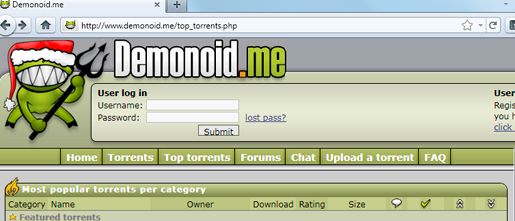These days it appears that the number of safe havens for file indexing sites is fast dwindling as Demonoid is shut down manually by Ukrainian authorities, following a request from Interpol.
Much like the recently blocked Pirate Bay, Demonoid provides a file indexing service, not hosting any content itself, providing tracking links to computers that are currently sharing the desired content. The site was ranked amongst the top 600 globally and the top 300 in the US and had been placed on the US's Notorious Markets list.

So what does this mean for the filesharing community? Yes, it's another message that indexing sites are becoming fair-play for authorities, where previously laws left them untouched, as they did not directly infringe any content themselves. On the other hand, likely this closure will have little impact on the overall picture.
There's a chance that the site may launch in a new location, stronger than ever thanks to a popularity boost from its closure, again, much like The Pirate Bay back in the day, which subsequently grew to become the largest BitTorrent site in the world. Should the site not reopen, as TorrentFreak editor, Ernesto Van Der Sar, quite rightly pointed out, the closure is "not going to stop the majority of people from sharing files as the most popular items are available though hundreds of other BitTorrent sites."
On the other side of the coin, Demonoid was known as a good source for rare content that couldn't be obtained through legitimate retail means and content that was never under copyright in the first place, thanks to a fairly vibrant forum community. With this and Ernesto's comment in mind, it places into doubt if the measurable consequences of the site's closure uphold that ever important EU balance of IP enforcement vs the rights of the public.













